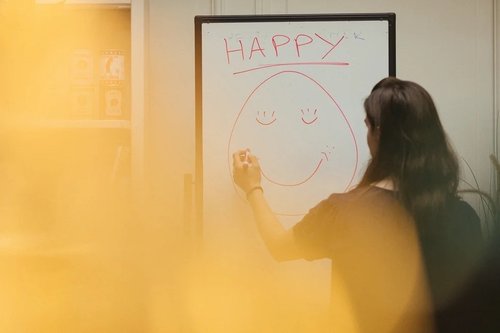The job next door: is the grass really greener on the other side of the fence?
Jan 17, 2022
6 mins


Rédacteur & Photographe
“That guy’s job is super-rewarding.” “Palliative-care nurse, that’s a job with a purpose.” “Teaching could be good too: they’re always on vacation.” “And that blogger who earns a living traveling…” Dream on. When you take a peek over the fence, the grass always looks greener. The soil is more fertile, the land better positioned and the gardener better equipped. Everything grows effortlessly. You don’t have to do much to reap the rewards. Welcome to paradise, a lush Garden of Eden. A quick glance at our side of the fence and we’re back to harsh reality. Here, everything looks like a wasteland, where only weeds will grow. Nothing takes. So we sulk and moan and get frustrated. Vanessa Lauraire, occupational psychologist and psychotherapist, takes a look at this natural instinct to compare and shows us how we can turn our frustration into a driver of action.
Comparison: a matter of survival
“We are all subject to comparative thinking,” says Lauraire. “Our reptilian brain’s mission is to ensure our survival and, in order to do so, we must respond to a program that tells us to feed, reproduce, gather as much information as we can, explore, conquer and dominate our environment—all with as little effort as possible!” So comparison is instinctive. “I observe my surroundings and compare myself so I can strive to be the best, and ensure my survival,” she says. “We are wired to continually improve our social standing.”
Even the Neanderthals were subject to comparison. “Comparisons have existed since the beginning of mankind, it is only the references that change,” says Lauraire. “Today, in western societies, immediate danger is no longer much of a threat. It’s psychological danger to think that ‘others are better than me.’ ‘Others’ are then perceived as a threat. So we compare ourselves and evaluate to choose the best possible strategies: flight (feeling bad, avoidance techniques), inhibition (not moving, playing dead) or competition (fighting, surpassing ourselves).”
From comparison to frustration
When I look next door, I see in my neigbor everything I don’t have, all the things I’m missing. “We all try to fill this void by looking outside for what we can’t find within ourselves,” says Lauraire. That other person looks better than me. They earn more money, have a more important job, a larger network, work that has more meaning, a more balanced life…
“Comparison generates a form of frustration,” she continues. “This feeling of frustration is neither good nor bad in itself, but it will prompt a reaction.” The frustration resulting from this comparison can cause admiration, inspiration, stimulation, or conversely stress, anger, jealousy, and other negative thoughts and feelings.
Frustration generates “projective actions” such as surpassing ourselves to achieve a goal, improving ourselves to be “as good as someone else” or, on the contrary, harmful actions that include devaluing ourselves, exhausting ourselves (burnout), or “destroying” the person identified as an enemy.
Fantasies: beware of perception bias!
So, comparison is pretty natural, right? In the past, it was standard to have a permanent contract in a large company or a generous salary. “Today, the social norm is more subtle,” says Lauraire. “We are looking for meaning, for a balance in life. However, this new benchmark gives us much more grounds for comparison.” Little by little, it slips into all aspects of our life: social networks are a hotbed for comparison. LinkedIn shows us the brilliant careers of our former classmates and Instagram is full of portraits of perfect families. The internet, advertising and marketing give us an ideal image of others, constantly leading us to compare and devalue ourselves. “Society makes us eternally dissatisfied,” notes Lauraire.
“We all tend to fantasize about different lifestyles,” she continues. “The problem is, we don’t see others for who they are. We are subject to perceptual bias, which means that we only see in others what we want to see and what they want to show us.” Take the example of a Michelin-starred chef. My image of their success is distorted. Behind the facade of their success, their passionate profession, I don’t see the hours spent in doubt, the stress they endure, the months without a single client, the financial struggles and all their personal sacrifices. Yet this is the reality for most of them.
“It is important to bring your dreams back to reality and strive to get a realistic view of others,” insists Lauraire. So when you take a step back and look at the picture as a whole, the other person’s professional or personal life suddenly seems less perfect than you thought… Welcome to the real world!
5 tips for dealing with comparisons at work
Society plays on our cognitive bias. We are subject to social injunctions—and they are often contradictory. “To avoid surrendering to comparison, you must ground yourself in reality and regain clarity,” says Lauraire. Here are five tips to help you do that.
1. Know what you need
We often imagine that others have the perfect job. “However, a profession is always part of an organization and there is no perfect organization,” says Lauraire. “There is no such thing as a perfect situation, it all depends on what you are looking for in your job.” What is the most important thing in my job? What functions should my work fulfill in my life? What needs should it meet? “Take a look at Maslow’s famous hierarchy of needs,” Lauraire suggests. Ask yourself where you stand in relation to your profession. Does it have to meet your physical and safety needs? Do you seek recognition or a sense of belonging in your job? “There will of course be frustrations because a profession cannot meet all these needs,” she concedes. “It’s up to each individual to set their own priorities and goals.”
2. Accept frustration and restraint
“You then have to accept frustration,” Lauraire says. “Gaps will always appear when choosing a profession, because to choose is to give something up.” So, living off your passion often means giving up on earning a good salary. “If you expect your job to guarantee you a salary every month, then you’d better make your passion your hobby,” Lauraire suggests. If, on the other hand, you are looking for meaning and personal fulfilment in your professional life, you will be less likely to go for a “comfortable” job. “The balance is in accepting that not all of our desires can be fulfilled by work,” she says. “It is up to us to find the best balance.”
3. Stay open to opportunities and change
“We find balance in movement,” says Lauraire. To make sure you are in tune with your desires and to avoid experiencing frustration, which can be destructive, “you have to constantly question yourself,” she says. “The balance that may once have worked for you could change. Stay open, cultivate your curiosity, take a step back so as not to get stuck on one path, continue to learn about yourself, and train yourself to acquire new skills.” If the urge to compare comes back time and time again, it could be a sign that your balance is off. Take the time to re-examine your needs and desires. Are they fully satisfied in your current situation?
4. Confronting reality
We can often be misled by perception bias, as it presents us with a deceptive view of reality. When you find yourself in the throes of comparison, try to take a step back. “You have to learn to change your outlook on yourself and on others,” says Lauraire. “Stop fantasizing about other people’s jobs, for a start.” Are you literally dreaming about certain jobs? Do you feel you have what it takes to be an entrepreneur, a chef or a photographer? “Make a list of all the jobs you dream about,” she suggests, “and confront the dream with reality.” Meet people who work in these professions, go see how they operate, talk to them about their daily life, the advantages and disadvantages. Then compare the results of this survey with your needs. You will often find that the dream doesn’t correspond with reality.
5. Be active, stop suffering
Comparison can generate stress as well as negative thoughts and feelings. If we are fed up and constantly dissatisfied, something is wrong. “There is no point moaning, we need to take action,” Lauraire suggests. “We mustn’t just put up with the situation, but assume responsibility for what we are going through.” If after all that you still can’t stop comparing yourself to others and the grass is still greener elsewhere, you have to reinvent your job. “This does not necessarily mean leaving everything to change jobs. Sometimes an internal transfer is enough,” says Lauraire. And if you can’t take that leap, ask for help—whether that’s from a psychologist, a coach or a skills assessment, there are many options available to you.
So, on closer inspection, what does your neighbor have that you don’t? Is the grass really greener on the other side of the fence? “When I compare myself to my neighbor, I project myself into an ideal state,” says Lauraire. “But be careful: we must always bring our dreams back to reality.” Does the grass look more lush in the garden next door? Roll up your sleeves and get to work on your own. Life is often more down to earth than it seems.
Photo: Welcome to the Jungle
Translated by Kim Cunningham
Follow Welcome to the Jungle on Facebook on LinkedIn and on Instagram and subscribe to our newsletter to get our latest articles every day!

More inspiration: Our relationship with work

Advice for people pleasers: Breaking free from being “too nice” at work
Do you often say things like, "Yeah, sure, I can do that!" when in fact you don't have the bandwidth to do that? We've got you.
Dec 12, 2024

There’s no place like home: Does relocation hurt productivity?
Relocating often brings homesickness, but it’s part of the journey. Here’s how to embrace the change and make the most of it.
Oct 22, 2024

Should you take your office crush to the next level?
Is an office crush worth the risk, or more damaging to your career and reputation than you think?
Oct 09, 2024

Young workers on unpaid internships: Was it worth it?
While internships build skills and connections, unpaid ones can limit opportunities for those who can't work for free. Is it fair?
Sep 12, 2024

Sleeping less to succeed more: Do CEOs sleep as little as we think?
In today's fast-paced corporate world, a common belief is that successful leaders, particularly CEOs, need less sleep to achieve their goals.
Aug 26, 2024
The newsletter that does the job
Want to keep up with the latest articles? Twice a week you can receive stories, jobs, and tips in your inbox.

Looking for your next job?
Over 200,000 people have found a job with Welcome to the Jungle.
Explore jobs